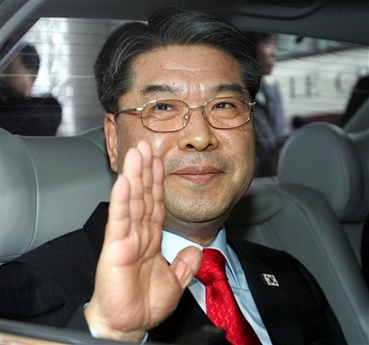Koreas resume high-level meetings
(AP)Updated: 2007-02-28 06:25
|
South Korean Unification Minister Lee Jae-joung waves before leaving for Pyongyang, the North Korean capital for Cabinet-level talks between the two Koreas at government house in Seoul, Tuesday, Feb. 27, 2007. [AP] |
North and South Korea held high-level reconciliation talks Tuesday for the first time since the North Korea's nuclear test in October, paving the way for a resumption of aid to the impoverished country.
The meetings came as North Korea showed strong signs of commitment to its Feb. 13 pledge at international arms talks to shut down its main nuclear reactor within 60 days in exchange for energy aid.
It has already invited the chief U.N. nuclear inspector to visit to discuss verification of a shutdown.
North Korea's main nuclear negotiator, Vice Foreign Minister Kim Kye Gwan, headed for the United States for talks on following through on the landmark deal on dismantling its nuclear weapons program. Kim stopped over in Beijing en route to the U.S., the Chinese Foreign Ministry said.
South Korea plans to focus this week's Cabinet-level talks in the capital of Pyongyang on winning a firmer North Korean commitment to carry out the nuclear deal and on measures aimed at bringing permanent peace to the divided peninsula.
The chief South Korean delegate, Unification Minister Lee Jae-joung, praised the nuclear deal at an informal meeting with his North Korean counterpart, Senior Cabinet Councilor Kwon Ho Ung.
"A good agreement was reached ... based on the principle of equality and balance," Lee told Kwon during a 15-minute chat at his hotel, according to pool reports. Kwon did not respond, the reports said.
Lee later told a welcoming dinner hosted by North Korean Prime Minister Pak Pong Ju that the neighbors should get reconciliation projects back on track now that the "skein of thread that gave us a hard time last year" is being unwound, referring to the nuclear standoff.
Pak made no mention of the nuclear issue in his speech, stressing only that the two sides should put the interests of Korean people ahead of anything else.
In Seoul, President Roh Moo-hyun said it was important to show North Korea that it would get more for abandoning its nuclear weapons than keeping them.
"We have to keep sending signals that their security will be guaranteed and they could get profits through reform and openness," he told a news conference.
Roh also said he believed North Korea would not use its nuclear weapons unless attacked first.
The Cabinet-level contacts ¡ª which began after the countries' only summit in 2000 ¡ª are their highest regular dialogue channel. Both are still technically at war because the 1950-53 Korean War ended in a cease-fire, not a peace treaty.
The dialogue process has often been overshadowed by political tensions, especially over North Korea's missile and nuclear programs.
It abruptly pulled out of the last talks in July in anger over South Korea's refusal to offer aid after North Korea test-fired a series of missiles. Their relations further soured after the Oct. 9 nuclear test.
North Korea is expected this week to renew its demand for fertilizer and rice aid. The South is widely believed to be willing to resume such shipments, but it remains unclear how much it would give.
Other topics expected to be on the agenda include a resumption of reunions of
families split by the heavily armed border, and tests of a train line across the
frontier. The reunions have been on hold since last year, and a planned test of
the train line was canceled because North Korea's military said proper security
arrangements had not been made.
|
||
|
||
|
|
